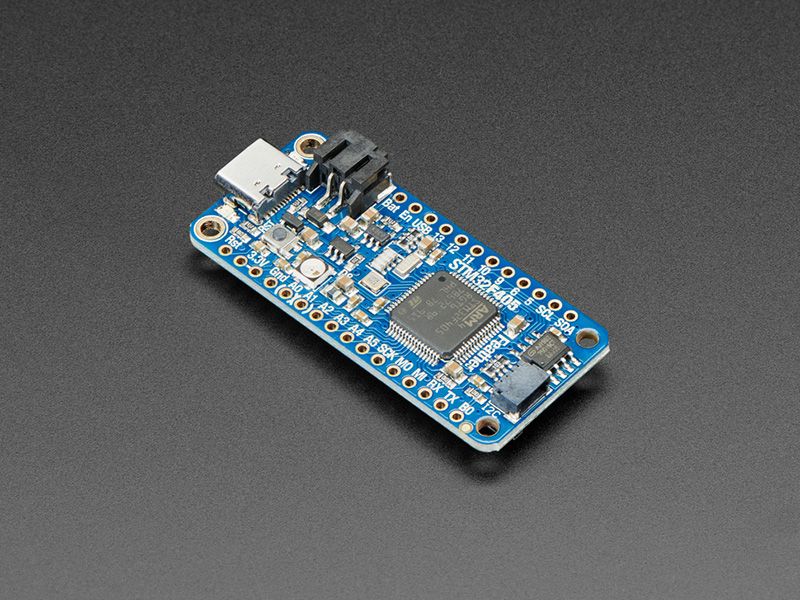Feather STM32F405 Express
by Adafruit

ST takes flight in this upcoming Feather board. The new STM32F405 Feather (video) that we designed runs CircuitPython at a blistering 168MHz – our fastest CircuitPython board ever! We put a STEMMA QT / Qwiic port on the end, so you can really easily plug and play I2C sensors.
This Feather has lots of goodies:
STM32F405 Cortex M4 with 1MB Flash, 168MHz speed 3.3V logic, but almost all pins are 5V compliant! USB C power and data - our first USB C Feather! LiPo connector and charger SD socket on the bottom, connected to SDIO port 2 MB SPI Flash chip Built in NeoPixel indicator I2C, UART, GPIO, ADCs, DACs Qwiic/STEMMA-QT connector for fast I2C connectivity We use the built-in USB DFU bootloader to load firmware. It does not come with a UF2 bootloader. With CircuitPython basics running on this board, it’s fast to get all our drivers working, then use the built in plotter in Mu to instantly get sensor data displaying within 3 minutes of unboxing.
You can use MicroPython, CircuitPython or Arduino IDE with this board, with some caveats. This board and chipset is new so expect rapid developments and updates!
CircuitPython support is under development. We have digital IO, analog in/out, I2C, SPI, PWM working so far and more on the way. For example, the SDIO SD card is not yet supported natively. DisplayIO is also not yet supported. Arduino is supported through STM32duino. There’s no auto-reset bootloader support yet so you have to pull the BOOT0 pin high and manually reset before uploading. That said, STM32 support is really good, and we were able to run just about every sketch we tried. MicroPython support is very solid but Adafruit does not provide MicroPython libraries for sensors! We tested this in Arduino STM32duino with all our FeatherWings and only the RFM69/RFM9x libraries did not work (they are very platform specific). Its an extraordinarily fast Feather, and our first foray into STM32 - very exciting!
Tutorial
Purchase
Contribute
Have some info to add for this board? Edit the source for this page here.
CircuitPython 9.2.1
This is the latest stable release of CircuitPython that will work with the Feather STM32F405 Express.
Use this release if you are new to CircuitPython.
Built-in modules available: _asyncio, _bleio, _pixelmap, adafruit_bus_device, adafruit_pixelbuf, aesio, alarm, analogio, array, atexit, audiocore, audiomixer, audiomp3, audiopwmio, binascii, bitbangio, bitmapfilter, bitmaptools, board, builtins, builtins.pow3, busdisplay, busio, busio.SPI, busio.UART, canio, codeop, collections, digitalio, displayio, epaperdisplay, errno, fontio, fourwire, framebufferio, getpass, gifio, i2cdisplaybus, io, jpegio, json, keypad, keypad.KeyMatrix, keypad.Keys, keypad.ShiftRegisterKeys, keypad_demux, keypad_demux.DemuxKeyMatrix, locale, math, microcontroller, msgpack, neopixel_write, onewireio, os, os.getenv, pulseio, pwmio, rainbowio, random, re, rgbmatrix, rtc, sdcardio, sdioio, select, sharpdisplay, storage, struct, supervisor, synthio, sys, terminalio, time, touchio, traceback, ulab, usb_cdc, usb_hid, usb_midi, vectorio, warnings, zlib
Features: Feather-Compatible, Battery Charging, STEMMA QT/QWIIC, USB-C, Breadboard-Friendly
Absolute Newest
Every time we commit new code to CircuitPython we automatically build binaries for each board and language. The binaries are stored on Amazon S3, organized by board, and then by language. These releases are even newer than the development release listed above. Try them if you want the absolute latest and are feeling daring or want to see if a problem has been fixed.
Previous Versions of CircuitPython
All previous releases of CircuitPython are available for download from Amazon S3 through the button below. For very old releases, look in the OLD/ folder for each board. Release notes for each release are available at GitHub button below.
Older releases are useful for testing if you something appears to be broken in a newer release but used to work, or if you have older code that depends on features only available in an older release. Otherwise we recommend using the latest stable release.
